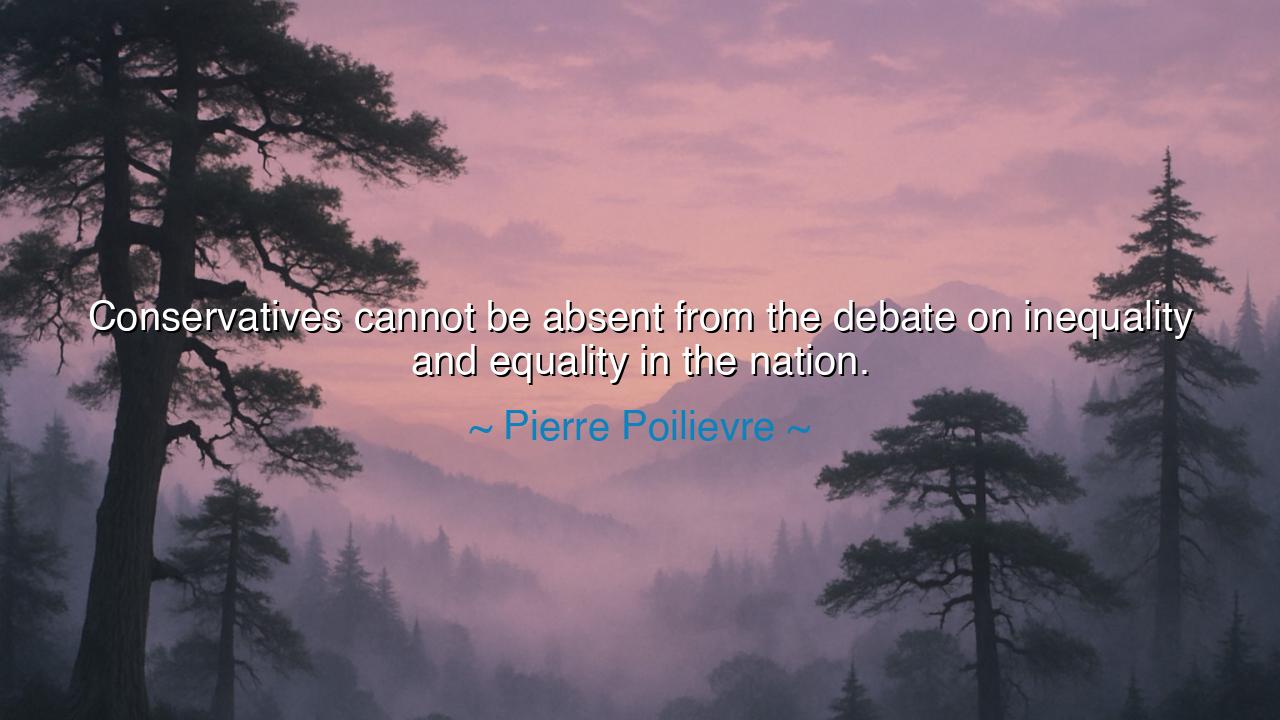
Conservatives cannot be absent from the debate on inequality and
Conservatives cannot be absent from the debate on inequality and equality in the nation.






Pierre Poilievre, in a statement both cautionary and stirring, declared: “Conservatives cannot be absent from the debate on inequality and equality in the nation.” These words rise not merely as a political plea, but as a recognition of duty—duty to truth, to justice, and to the stewardship of a people’s future. For when one voice withdraws from the forum, the dialogue is incomplete; when one camp remains silent, the balance of wisdom is lost. Equality, he reminds us, is not the possession of one ideology but the responsibility of all.
When he speaks of inequality, Poilievre acknowledges a reality that no society escapes. Inequality festers in wealth and poverty, in access to education, in opportunity between genders, and in the treatment of minorities. To ignore these disparities is to turn away from the cry of the people. Yet he also speaks of equality, not as an abstract dream but as a goal to be debated, defined, and pursued. By urging conservatives to remain engaged, he calls for a blending of perspectives: the desire for freedom with the demand for fairness, the need for order with the hunger for justice.
The origin of such words lies in the great tension of democracy itself. Throughout history, the debates between different schools of thought—whether liberal or conservative, radical or traditional—have not been mere squabbles, but the very forge of progress. Consider the debates in the United States during the Civil Rights era. Some conservatives opposed sweeping federal action, yet others—like Senator Everett Dirksen—stood firmly to support the Civil Rights Act of 1964. His conservative voice, added to the chorus of progressives, gave strength and legitimacy to the cause of equality. Without both sides in the arena, justice might have been delayed, and freedom diminished.
To be absent from this struggle, as Poilievre warns, is to surrender the field. When conservatives withdraw from the debate on inequality, they allow the narrative to be shaped by others alone. They risk becoming spectators rather than builders, reactive rather than visionary. But when they engage—bringing their emphasis on responsibility, stability, and the worth of individual effort—they enrich the discourse, offering balance to passion, and grounding lofty ideals in practical application.
The deeper meaning of Poilievre’s words is that equality is not owned by any one faction. It is not the property of progressives alone, nor the invention of revolutionaries. It is the birthright of every human being, and therefore must be safeguarded by every voice within the nation. If conservatives neglect this duty, they betray their own heritage, for true conservatism is not the defense of privilege, but the protection of the whole community from forces that would tear it apart.
History shows us the cost of silence. In times when leaders turned away from inequality—when they ignored the cries of peasants, slaves, or the working poor—societies burned with revolution. The French Revolution, born of vast inequality between the classes, teaches that when debate is absent, chaos will take its place. If conservatives had spoken sooner, acknowledging the grievances of the people and offering reforms, the guillotine might never have become the people’s voice. Silence, therefore, is dangerous; engagement is the path of peace.
The lesson for us is this: never abandon the debates that shape the soul of the nation. Whether you are conservative, liberal, or of no party at all, speak to the questions of justice. Defend the dignity of the poor as fiercely as you defend the rights of the wealthy. Protect the balance between liberty and fairness, ensuring neither overwhelms the other. And above all, do not remain silent when inequality festers; for silence, in the end, sides with the oppressor.
Thus Pierre Poilievre’s words stand as a call to arms—not with swords, but with voices: “Conservatives cannot be absent from the debate on inequality and equality in the nation.” Let this truth be carried forward: that only when all voices are heard, and all hearts engaged, can a nation truly walk the path of justice. And let each of us, in our own way, refuse the comfort of silence and embrace the labor of speech, for in that labor the future of equality is secured.






AAdministratorAdministrator
Welcome, honored guests. Please leave a comment, we will respond soon